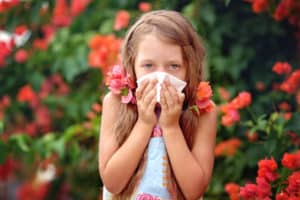
Allergy rates among children in the United States are on the rise. Over 40% of children suffer from allergies, and 8% have asthma, a potentially serious condition that can lead to emergency room visits and an increased risk of contracting influenza. The pediatric doctors at Pediatric Associates of Dallas are highly experienced in dealing with children with allergies. Consider the following tips to ease your child’s allergy symptoms.
-
Avoid
On dry, windy days when the pollen count is high, it’s best to stay indoors. Avoid allergens on days like this by keeping the windows closed, too.
Do not line dry clothes. Pollen, dust, and other allergens will stick to the material, essentially clothing your child in allergens.
If you and your child must go outside on a high-pollen count day, wash up and change clothes as soon as you get home. It’s a good idea to have your child bathe and wash their hair so no allergens can stick to them or their bedding. Warm, steamy water can help loosen any nasal congestions and relieve itchy, irritated eyes.
-
Medications
Allergy medications work best if they have time to accumulate in the body. While it may not seem right to give your child medication as soon as allergy symptoms hit, this is the optimum way to prevent an allergy attack. Have your child take their allergy medicine before pollen counts start to climb and continue taking it through the entire allergy season.
-
Stay Hydrated
Dry air can make allergy symptoms worse. Adding a dehumidifier to the household can alleviate some of these symptoms.
Make sure your child drinks enough water. If they have a sore throat from allergies, drinking warm tea, or gargling with salt water can alleviate their discomfort.
Cold compresses over the eyes can relieve itchy eyes, and hot compresses against the face can lessen sinus pressure and congestion.
Living with allergies can make life miserable, but there are many things you can do to alleviate your child’s symptoms. Always be sure to keep their medication well-stocked and talk to your pediatric doctor about seeing an immunologist if medications aren’t effective enough for them.
Sources:
https://www.health.harvard.edu/blog/4-must-kids-seasonal-allergies-201604129511
http://www.aaaai.org/about-aaaai/newsroom/asthma-statistics
